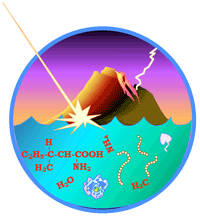Creation Corner
Question evolution – origin of life

The first question in Creation Ministries‘ Question Evolution campaign is: how did life come to exist, without either intelligence or design? That question is far more material, and far more relevant, than popular evolutionists want to admit.
Why question origins to question evolution?
Evolution advocates often hold that the origin of life need have no bearing on the change of that life over time. That is how they define evolution. They go on to say that the processes on which evolution depends, do not themselves depend on any one process for the origin of life.
But if that’s true, then why did G. A. Kerkut, in 1960 (Implications of Evolution), say that any “general theory of evolution” must include a theory of life’s origin? Jonathan Sarfati quotes him as saying precisely that:
[The General Theory of Evolution is] the theory that all the living forms in the world have arisen from a single source which itself came from an inorganic form. [But] the evidence which supports this is not sufficiently strong to allow us to consider it as anything more than a working hypothesis.
That second part might explain why evolution advocates today disavow any such definition as Kerkut gave fifty-one years ago. (W. T. Brown notes this here.) But Sarfati calls the lack of an agreed-upon, purely “natural” origin of life “a huge barrier for those desiring to be ‘intellectually fulfilled atheists.’” Sarfati is correct, and CNAV has long noted the fervid pursuit of such a naturalistic theory on various Internet forums.
Evidence that any origin of life theory must explain
To question evolution means to ask whether evolution, or any part of it, really can explain all the things we observe today. The origin of life is a good place to start. Any theory of the origin of life must explain all the things we observe about it:
- Any cell has literally hundreds of proteins. Proteins are highly complex and, except in an already-living environment, are not stable. (Ask any householder who is at the grocery store, replacing foodstuffs after the power has failed after a major storm.)
- Those proteins hold information. That information comes from DNA, the main ingredient of the cell’s nucleus. One nucleus holds enough information to fill all the books in ten Libraries of Congress.
- Protein synthesis is a very complex process that involves other proteins that already exist. The best reason for such a complex system seems to be to keep from making mistakes.
- The first atmosphere on earth cannot have held only methane, hydrogen and ammonia. Even most evolutionists now suggest that it held carbon dioxide, nitrogen, and free oxygen. The problem: carbon dioxide and nitrogen will stop organic compounds from forming out of nothing, and oxygen would destroy them outright.
- No one has ever seen life spontaneously arise from non-life in the wild, nor found any “primordial soup” or any sign that any place once held it.
Problems for a naturalistic hypothesis
The largest problems for a naturalistic process for the origin of life are:
- No system can self-inform. Therefore, the ten Libraries of Congress’ worth of information that every human cell holds, did not write itself. Even the relatively little information in an amoeba did not write itself.
- No one has found evidence that the conditions that would have allowed the ingredients of the first cell to form, ever existed in the wild.
- The parts of the complex machine that builds proteins had no function apart from one another. They work together or not at all.
Separately any one of these problems would seriously question evolution. Together they stop it cold. The reason: without an origin of life, nothing is available to evolve. And if the origin of life is divine, or at least supernatural, that alone destroys the purpose of the theory of evolution.
Conclusion
The origin of life depends on too many events, and too many conditions, that were not likely enough to have happened by themselves. Any honest statistician would have to advise: Reject the null hypothesis. Evolution is a null hypothesis, as any non-intervention hypothesis must be. Creation is an alternative hypothesis, one that assumes intervention.
To question evolution is to show that the null hypothesis cannot hold. To do that, one need only answer one question: how likely is the null hypothesis? The answer: literally not likely to happen in a billion years, or the four point five billion that uniformitarians insist is the age of the earth.
ARVE error: need id and provider
[amazon_carousel widget_type=”ASINList” width=”500″ height=”250″ title=”” market_place=”US” shuffle_products=”True” show_border=”False” asin=”B00375LOEG, 0451947673, 0800733940, 0062073303, 1595230734, 1936218003, 0981559662, 1935071874, 1932172378″ /]
Terry A. Hurlbut has been a student of politics, philosophy, and science for more than 35 years. He is a graduate of Yale College and has served as a physician-level laboratory administrator in a 250-bed community hospital. He also is a serious student of the Bible, is conversant in its two primary original languages, and has followed the creation-science movement closely since 1993.
-

 Civilization3 days ago
Civilization3 days agoTariffs, the Supreme Court, and the Andrew Jackson Gambit
-

 Civilization3 days ago
Civilization3 days agoWhy Europe’s Institutional Status Quo is Now a Security Risk
-

 Civilization4 days ago
Civilization4 days agoDeporting Censorship: US Targets UK Government Ally Over Free Speech
-

 Executive4 days ago
Executive4 days agoWaste of the Day: Wire Fraud, Conflicts of Interest in Connecticut
-

 Civilization4 days ago
Civilization4 days agoEpstein and the destruction of trust
-

 Civilization2 days ago
Civilization2 days agoTrump Lashes Out at Supreme Court as Under ‘Foreign Influence’
-

 Education5 days ago
Education5 days agoWaste of the Day: Throwback Thursday – The Story of Robosquirrel
-

 Civilization3 days ago
Civilization3 days agoSvalbard: The Other Arctic Island Flashpoint













G. A. Kerkut is wrong, and the only reason that you quote him is that several of your questions don’t make sense unless
he’s right.
All that says is that you disavow him. The problem is: without an origin, there’s nothing to change.
The theory of evolution attempts to explain HOW and WHY life changes, not where it comes from.
Evolutionary theory is separate from abiogenesis for a practical reason: the principles involved within each scantly overlap with one another. Sure, basic rules of chemistry and physics apply, but that’s about it; from there, learning more about evolutionary theory doesn’t inform our study of abiogenesis, and vice-versa.
Whenever Creationists insist on lumping abiogenesis into evolutionary theory, they eventually drag out the 50-year-old Kerkut quotes. They never realize that Kerkut’s ideas aren’t widely cited, if at all, by the professional scientific literature. Again, the reason for such lack of citation is simple: I gave such reason in the previous paragraph.
And I gave my perception of the real reason in the paragraph I submitted previously. Bruce Geller might be having quite a chuckle over this. So would any master con artist who ever threw his accomplice under the bus when said accomplice got caught.
Biologists in general never claimed that abiogenesis was part of evolutionary theory. That was Kerkut’s complaint. I know this because I read Kerkut for myself; I’m sure that you haven’t.
Well, I can then say this for Kerkut that I cannot say for his colleagues, and neither could he: he was honest.
Thus you accept the truth: evolutionary theory does not include abiogenesis, and never has for all practical purposes. I expect you to retract your article as a result … that is, if you’re an honest man.
No, I do not. I say that Kerkut honestly said that you cannot have change of life without origin of life. His colleagues wanted to have it both ways. He was having none of that. Neither am I, though I approach the problem from the side opposite his.
Kerkut did not say that. Again, I’ve read Kerkut and you haven’t. I know, and you don’t. And that’s the only truth here that matters.
Then explain how he is wrong. The established law of thermodynamics work against evolution. Complex systems always break down into the simple systems and components unless maintained by an outside agency. Even DNA is maintained by an outside agency in the cells. Don’t maintains a system and it fails. Be it a car, house, or a cell.
When one considers all of the chance occurrences that evolution says has to happen for it to occur I have a better change of winning my local Lottery Jackpot by not playing it and having a random person give me the winning ticket. It is the classic question which came first – the chicken or the egg.
You comment read like “I can not dispute his claim so I refuse to accept it and will ignore it and its implications”. That is not science but ideology.
Its not a matter of dispute, its just a simple fact that the theory of evolution does not address in any way where life came from. It only address’s the changes that life goes through AFTER its here, the theory of ABO-GENESIS address’s where life came from.
You mean it doesn’t address that anymore. It did back in 1960. That is, until the Guardians of the Narrative, whoever they might be at the moment, realized that they literally could not, in a million years, cook up a good excuse for saying that life arose from non-life. So they tried to pull a Geller:
[…] Question evolution – origin of life […]
Actually Darwin himself was quite fond of Abiogenesis. He speculated how in a warm pond somehere all the ingredients for the spontaneous generation of life were likely present, whence the miracle occurred.
Abiogenesis is a far less likely miracle than virgin birth.
Darwin didn’t write entire books on abiogenesis. Thus, to claim that “Darwin himself was quite fond of Abiogenesis” is misleading, at best.
Why’d he mention it, then?
Why does mere mention matter here? That’s what it was: “mere mention.” Darwin wrote no papers for biology journals or societies on the subject.
Unfortunately, Creation activists like to quote out-of-context. The problem with that practice is that such practice is eventually exposed as deception. But then, Creation activists don’t mind being cast as liars and deceivers now, do they?
Tell me this: if every evolutionist really has abandoned abiogenesis, then why do you find some projects aimed at creating new bacteria in the laboratory? And by the way: Kerkut wasn’t and isn’t the only one.
I didn’t claim that “every evolutionist really has abandoned abiogenesis.” Rather, I said that evolutionary theory doesn’t include abiogenesis. All you have in support of claiming that evolutionary theory DOES include abiogenesis is a quote in a letter Darwin wrote to Joseph Hooker, and a 50-year-old Kerkut quote from a source that, by your own admission, isn’t cited in the professional scientific literature. IOW your case for including abiogenesis within evolutionary theory is extremely skimpy at best, to non-existent at worst.
And the words of Thomas Huxley in 1870.
Wow, another old quote (140 years old) that’s never cited in the professional scientific literature. Color me unimpressed.
The facts are simple. Abiogenesis is not included as part of evolutionary theory; we simply don’t see such inclusion within the professional scientific literature. Yet it’s clear that you want to believe that inclusion is a reality, despite the facts.
Honestly, now: why MUST you believe that such inclusion is a reality?
Well, now: I do include abiogenesis in evolution, despite your Gellerite disavowal, because without an origin of life, you have nothing to change.
If the origin of life were truly irrelevant to evolution, then you would be perfectly willing to accept Divine creation as an alternative to the “primordial soup.” You’re not. At least, your tone suggests that you’re not.
Or maybe you’d rather accept panspermia. You’ve seen the second article; that much I know. Well?
I see nothing about about accepting Divine creation of Earth’s first life forms that leads to any change in evolutionary theory whatsoever. Similarly, I see nothing about accepting “naturalistic” causes for Earth’s first life forms that leads to any change in evolutionary theory. Evolutionary theory remains intact either way, and we’ve no reason to change it solely on such basis.
We’re back to my question. Abiogenesis is not included as part of evolutionary theory; we simply don’t see such inclusion within the professional scientific literature. Yet it’s clear that you want to believe that inclusion is a reality, despite the facts.
Honestly, now: why MUST you believe that such inclusion is a reality?
I say that it is real because without an origin of life, you don’t have life.
And the idea that you would accept Divine creation of life itself strikes me as unlikely in the extreme, given the tone of your comments. Furthermore: once you accept the idea of Divine creation, you must then admit the possibility that all the life forms we see today, had their beginnings, not in one species, but many.
The very purpose of evolutionary theory is to obviate God.
I, on the other hand, am bearing witness for God. The repeated spectacle of legal action by atheists, who seek to assert that anyone who believes in God is non compos mentis, necessitates such action by myself and others.
By your logic, chemistry MUST include the origin of atoms, otherwise there’d be no chemistry. Similarly, “the very purpose of [chemistry] is to obviate God.” Yet you don’t question chemistry the way you question evolutionary theory: directly as an assault on theism. This inconsistency strongly suggests that there’s something else in play here, and you’ve not shared that something else.
Regarding multiple supernatural origins, again we see an inconsistency of application. By your logic, OJ Simpson did not murder Nicole Simpson and her lover, because the DNA evidence collected by the police could have multiple supernatural origins. This is the problem with these kinds of explanations: they’re not applied consistently in manners that we can scientifically investigate.
I am simply stating an empirically investigable fact: abiogenesis has nothing to do with evolutionary theory, for all practical purposes. You do not deny that this is empirically true, but you deny that such empirical testing validly makes the point. Such denial is the essence of science denial: rejecting straightforward conclusions from observable facts, whenever there’s a conflict with your preferred conclusions.
You have been trained to regard evolutionary theory, plus a farrago of other ideas that enjoy strong scientific support, as a threat to your religious beliefs. Rather than consider that your rejection of such ideas may be itrational, you just blunder through.
The purpose of evolution is to explain why and how life changes over time and that is all it is.
Mr Campbell your statement is disingenuous. The Evolution Theories are all intended to show how life originated from a non-living starting point and became all of the species we see today and those that have disappeared. That is exactly what I was taught in the SECULAR PUBLIC SCHOOLS. And the “Tree of Life” was just that – everything connected – not that the “Tree of Life” is connected anymore or even exists.
Just because this little fact is omitted from the discourse because you can not explain it does not negate the necessity to explain how the first organism came into being. If you can not explain or put forth a theory on how the first organism came into existence how can show one species becoming another? And keep in mind evolution says the fruit fly and the elephant have a common ancestral organism.
Donald Laster wrote:
The Evolution Theories are all intended to show how life originated from a non-living starting point and became all of the species we see today and those that have disappeared. That is exactly what I was taught in the SECULAR PUBLIC SCHOOLS.
Geno answers:
When I taught biology for five years, there was a 5 chapter section on evolution that covered around 120 pages. Of that, about two paragraphs discussed the origin of life.
#####
Donald wrote:
Just because this little fact is omitted from the discourse because you can not explain it does not negate the necessity to explain how the first organism came into being.
Geno answers:
As has already been pointed out, we can discuss chemistry without knowledge of how atoms came to be. We can also discuss gravity without knowledge of why it exists.
Evolution can take place ONLY after life exists. For that reason, how life came to be is no more relevant to evolution than how atoms came to be is a requirement to understand chemistry or how gravity came to be is a requirement to understand you shouldn’t step off a cliff.
Chemistry does not try to explain the origins of the atoms just how they interact so your comparison is fraudulent and is an attempt as misdirection of the basic issue.
Evolution does tries to explain the origins of life and species and how they arose from what is considered non-living and became all of the existing species we see today and that lived in the past. And when a explanation can not be made evolution says just to assume it happened. You seem to forget that “evolution” is what is taught in the schools.
Donald, the fraud and misdirection arise from Hurlbut: “I do include abiogenesis in evolution, despite your Gellerite disavowal, because without an origin of life, you have nothing to change.” I demonstrated the fallacy of that remark by noting that, “by [Hurlbut’s] logic, chemistry MUST include the origin of atoms, otherwise there’d be no chemistry.” Please try to keep context in mind during these discussions.
Contrary to what the Crreation activists would like to believe, evolutionary theory DOES NOT try to explain how life first arose on Earth. Abiogenesis is, for all practical purposes, an entirely separate field of study from evolutionary theory. By analogy nucleosynthesis, which explains the origins of the chemical elements, is an entirely separate field of study from chemistry.
I don’t question that many biology classes in public high schools briefly mention abiogenesis in concept, if not by name. However, such mention does not mean that evolutionary theory necessarily includes abiogenesis. That leap of logic belongs to the Creation activists, including yourself apparently.
They very core of evolutionary theory is that the first specie arose by random chance (generally) and led to the development of all species in existence (living or extinct). Evolutionary theories omit the first specie since they can not create or describe a plausible mechanism of development so the question is avoided.
If you can not explain or give a plausible theory on how A originated, then B and C which supposedly produced all of the others, such as
+->B ….. D,E,F,G … etc.
A–+
+->C ….. H,I,J, K etc.
you have a serious hole present in the theory. The question is how did “A” originate or evolve or come into being. Especially, since the premise of evolution is everything is from “A”. You are trying to avoid the question since you can not think of an answer. To paraphrase Al Gore – it is an inconvenient question.
And as I pointed out in the other reply the comparison of Chemistry to Evolution is disingenuous. Chemistry does not attempt to describe the HOW atoms came into being – just how they INTERACT. Evolution is an attempt to describe HOW species came into existence. Therefore, as Terry pointed out – you still have to describe or give a theory on how the first specie came into being. It is a simple question of logic.
Let me borrow your phrasing, and make the key substitutions …
“The very core of chemistry (nucleosynthesis) is that hydrogen arose by random chance (generally) and led to the development of all elements in existence (stable or radioactive). Theories of nucleosynthesis omit hydrogen, since they can not create or describe a plausible mechanism of creating hydrogen so the question is avoided.”
This is the way your comments come across. You should be posting comments similar to the phrasing given here, but you’re not. You give chemistry a free ride as a result, when in fact it has a remarkably similar problem analogous to the one you claim for evolutionary theory.
Incidentally, the singular of the word “species” is “species.” Your error concerning this word marks you as an individual who is fundamentally ignorant of this topic. IMO you should simply admit to your ignorance, and move along with topics with which you actually have some relevant knowledge.
Yes – I know I misspelled it. But I stand by my statement. Evolution requires a way to explain the first living organism since evolution is describing how the species came to exist. So how did the first species come into existence? If the theories can not explain how mitochondria, DNA and the other structures in cells came to be formed how can the theories properly expound how one species becomes another? Especially considering the structure of cells. By omitting it you are making a big assumption that “somehow” life just occurred by some random series of events. Which flies in the face of the laws of thermodynamics.
Chemistry does not explain or try to explain how atoms are created. It simply deals with the interactions of the atoms with each. Evolution tries to describe how species are created. Two very different things. So your attempt at equating the them is logically flawed.
Donald, you didn’t merely misspell “species.” Rather, you clearly did not understand that “species” is both a singular and plural form. Worse, you are now trying to weasel your way out; you are essentially claiming that you DID understand, but that you merely “misspelled” it. Such weaseling does not reflect well on your character.
For the last time, evolutionary theory does not require an explanation regarding how life first arose on Earth. In evolutionary theory, life is treated as a given, much as in chemistry the elements are treated as givens. There is no logical requirement for evolutionary theory to explain the origin of first life, UNLESS there’s something else at stake here.
I submit that it is ATHEISM that requires explanation for first life’s origin on Earth. Creationists typically conflate evolutionary theory with atheism; IOW evolutionary theory equals atheism. The problem with that view is that most people who accept evolutionary theory (the real one, without abiogenesis) also believe in God; at least, this is true in the United States.
Finally, you clearly are not interested in looking deeply into this subject for yourself. In fact, there are explanations for many cellular structures, including some structures that you specifically mentioned. You just haven’t bothered to look for yourself. I submit that you won’t bother, and I don’t breastfeed intellectual infants.
All right, now we’re getting somewhere. Maybe. Your protests might make sense, if you’re one of those “theistic evolutionists,” who would accept Divine creation but not Divine intervention. This is a close cousin to the “deism” of the Enlightenment. Yet I regard that as a distinction without a difference. Or at a minimum, I conclude that the God you acknowledge (I won’t say “worship”) is not the God I worship.
But in your last paragraph, you cop out. Understandable, since those explanations you mention, won’t hold. We can explain the purpuse of any given cellular structure. But any explanation of its origin must include what that structure was doing, all by its lonesome, until a larger structure came to incorporate it.
Indeed, we are getting somewhere. The concern with Hurlbut and Donald is less about evolutoinary theory; rather, the concern is about atheism. H&D must maintain the fiction that accepting evolutionary theory necessarily means embracing atheism, hence the need to integrate abiogenesis within evolutionary theory.
We now observe direct evidence of the need to de-couple theism from acceptance of evolutionary theory. Thus we observe the new fiction of convenience: theistic evolutionists “would accept Divine creation but not Divine intervention.” Unfortunately for Hurlbut, the facts say otherwise.
Gallup has been polling on this issue for about three decades now. Gallup’s pertinant questions are as follows:
1) Human beings have developed over millions of years from less advanced forms of life, but God guided this process
2) Human beings have developed over millions of years from less advanced forms of life, but God had no part in this process
3) God created human beings pretty much in their present form at one time within the last 10,000 years or so
Consistently and by a margin of over two to one, Americans who accept evolutionary theory chose the option that “God guided” the process of human evolution, over those who chose the option that “God had no part” in such evolution. Note that the phrase “God guided” necessarily implies Divine intervention. This directly contradicts Hurlbut’s claim that theistic evolutionists reject Divine intervention.
link to gallup.com
Here’s the problem: we have a Record—a Direct, Consistent Historical Record—of creation as an event. The billions-of-years model of evolution contradicts that Record.
I, on the other hand, have made myself familiar with several models that, taken together, vindicate that Record.
I have read that particular Gallup Poll. I see that Americans (most of them, anyway) are reluctant to dismiss God entirely. But they fail to understand Who He is.
I have said before, in articles that I submitted to another media outlet, that “theistic evolution” and “progressive creation” are not and can never be consistent with a proper understanding of God.
Theistic evolution is, at best, a position of naïveté, and at worst, a lie, depending solely on the mens rea of the speaker. I haven’t enough information—yet—to judge your particular mens rea. But I do know that the theistic-evolution model is inaccurate, does not even answer all the scientific questions that one could ask (the trouble being that too many scientists refuse even to consider those questions), and certainly relegates God to an Impersonal Force that no man can even reliably say stands for good or for evil.
You claim that “we have a Record—a Direct, Consistent Historical Record—of creation as an event.” Precisely what do you mean by the words “direct,” “consistent,” and “historical”? I could choose definitions from a dictionary, but I’m not likely to choose definitions with which you’ll agree; hence, I ask.
Direct: testimony from the One Who made it happen.
Consistent: not self-contradicting.
Historical: a document of historical facts.
I’m glad that I asked you for definitions. Your choices differ from mine considerably.
You used the word “testimony.” Again, exactly what do you mean by that word?
I like your definition for consistent: “not self-contradicting.” It’s clear and concise.
We have a problem with “historical.” You used the word in your definition. Will you try again, please?
“Testimony” is just what it sounds like: an account by a Witness, in this case some-One Who was not only there, but ran the whole show.
“Historical” in this context means either (a) something that actually happened, or (b) something that accurately reports what happened.
Let me see if I have this straight. When you wrote “a Direct, Consistent Historical Record,” you meant “an accurate account of actual events, where the account is ‘given’ by God in a manner that is not self-contradictory.”
Let’s move forward from there. God “is telling” somebody (perhaps Moses) this account. Is there more than one “telling from God” for a given set of actual events? Is it written down immediately? If so, does the account’s text take the form of precise dictation, or is there some leeway “bestowed” by God unto the author(s)? Is there a better way to describe this process “from God’s mouth” to the written account? How do we know of such process, one way or the other?
Please forgive the use of double-quotes in describing God’s “actions.” I do not presume to accurately describe “Divine action” on “Its Own” terms. I only have the experience of a mortal human being; I dare presume that God’s “actions” do not necessarily fit neatly into terms ordinarily describing such mortal human experience.
Actually, God told Adam, not Moses, about creation. The Annals of Creation (Genesis 1:1-2:4a) are a direct dictation, a memorandum. Ever heard of the Toledoth Hypothesis? That’s what Genesis is composed of (except that the Annals of Joseph were written on papyrus, not chiseled onto a clay tablet like all the others).
Now let me put it right back to you: you either believe in God, or you don’t. And you either believe Him, or you don’t.
Before you answer, bear in mind that this Record itself has the best quality-assurance system of any work of literature ever written, to ensure fidelity in the copying process. Every line on every page has a checksum, and every page has its own checksum. If the checksums didn’t match, the scribes making the copies had to throw the whole page out and start over. How’s that for QA?
The Toledoth Hypothesis is new to me. I looked it up in WikiPedia, just to get me started; rest assured that I take WP’s info with a grain of salt.
To sum up to this point, God “dictated” to Adam an accurate account of actual events, in a manner that is not self-contradictory, whereupon Adam immediately set the account’s precisely dictated characters to stone, clay tablet, or similar medium. Apparently, only Adam received this particular account.
Is this a clear understanding? If not, please offer correction and clarification. Thank you.
The creation account (Genesis 1:1-2.4a) was a dictation from God to Adam.
The next “toledah” was the Annals of Adam (Genesis 2:4b-5:1a). Adam left this history to his descendants; eventually it would come to Noah, who wrote his list of his own ancestors and an account of the first prophecy of the destruction of man: “I won’t want to fight with man forever. He has 120 years to get his act together.” (Genesis 6:2, paraphrase)
Then come the Annals of Shem, Ham and Japheth (Genesis 6:9b-10:1. This includes the Log of Noah’s Ark.
Next come the Annals of Shem (the Table of Nations and the Tower of Babel), then the Annals of Terah (generations from Shem to Abram, Nahor the Younger, and Haran), then the Annals of Isaac (that tell the stories of Abraham and Isaac).
The Annals of Jacob include the Annals of Esau (listings of the Sheikhs of ancient Idumaea).
Last of all come the Annals of Joseph. These begin with Joseph and his brothers, and continue to the day of Joseph’s death.
Most of these Annals originally were written on clay tablets. Each of them ended in a “colophon” that always followed a formula: “These are the generations of…” The word rendered generations actually means “annals.” The exception: Joseph’s annals probably came to Moses on papyrus, an Egyptian invention.
The point here is that except for the Annals of Creation, each of the Annals takes the name of the man who wrote them.
In case you’re wondering: I reject out-of-hand the secularistic Documentary or “Jay-Dep” Hypothesis, that tries to attribute the words of the Bible (or at least its first five Books) to “Yahwist” or “Jehovist,” “Deuteronomic,” “Elohist” and “Priestly” writers.
What language was used by Adam (and presumably also by God) for these tablets?
Old High Hebrew, of course. Hebrew is the root of all human language.
How do we know that it was Old High Hebrew? These alleged tablets chiseled (?) by Adam don’t exist in the modern day. How would we know what language was used for these tablets, if indeed these tablets ever existed at all?
And how do we know that “Hebrew is the root of all human language”?
I am not a linguist, but I’ve talked to one who has studied the ancient languages extensively. Languages, first of all, do not evolve; they devolve. Beyond that, you want to find the language that is more dependent on native roots than any other. (English, for example, borrows 70 percent of its words from Greek and Latin.) The one language that did not borrow anything from any other language, including the names of letters, is Hebrew.
Why assume that the language looked anything like any modern language? Why assume (rather than conclude) that Hebrew “did not borrow anything from any other language”? After all, there are extinct languages extremely similar to Hebrew; why should we necessarily conclude that Hebrew came first, and that the other Canaanite languages (for example) came later?
Here’s something you obviously overlooked: Hebrew lay dormant for two thousand years, until Eliezer Ben-Yehuda took on the monumental task of reviving it, and moving it from liturgy-only to everyday use. To do that, he had to add several words, but he used the ancient roots and kept the ancient grammatical and syntactical structure. So modern Hebrew is closer to classical Hebrew than the modern version of any other language is to its classical version.
I didn’t know about Eliezer Ben-Yehuda and this is all very interesting, but it doesn’t address my question: how do we know that Adam’s tablets were in Old High Hebrew, and not some other extinct language?
Let’s deal with the elephant in the room. We do not have Adam’s tablets. Furthermore, there is no known record of Adam’s tablets ever existing in the first place. These facts point to a logical null hypothesis: “Adam’s tablets” never existed in the first place.
Can you provide statistical testing to rule out the null hypothesis here? Anything other than an unqualified “yes,” followed by a detailed proof of such testing, will be interpreted as “no Rubble, I cannot rule out that null hypothesis. Therefore we should consider that these tablets never existed, by default.”
Try this essay for starters.
There’s no statisical test of the null hypothesis: Adam’s tablets never existed. Therefore, we should consider that these tablets never existed, by default.
I’ll likely find the reference, in time. In any case, the real null hypothesis is that life began from non-life, absent any intelligent intervention. Now there is your challenge.
IOW you accept that “life began from non-life, absent any intelligent intervention” is the default. If you have a problem with that, you’ll need to provide the statistical proof to that effect. Please bear in mind that previous attempts typically suffer from numerous errors, mostly related to ignorance of documented observations that have been confirmed and refined through further research. IOW you should familiarize yourself with ALL of the relevant literature before you start down that road.
Getting back to the elephant in the room, we have now established that, by default, Adam’s tablets never existed. Thus your “Direct, Consistent, Historical record” has an uncertain provenance, to put it politely; IOW you provide no reason to believe that such a record “contradicts” evolutionary theory. We have no “account by a Witness, in this case some-One Who was not only there, but ran the whole show,” because you flatly reject any source for such account other than Adam’s tablets. But since Adam’s tablets never existed by default, there goes your record and thus your contradictory reasoning.
“Life begins from non-life, absent any intelligent intervention” is the null hypothesis. And the odds against that are still too long.
I agree that it’s the null hypothesis. That means that it “wins” unless it can be statisically disproven; typically we like to see a 95% (2s) confidence in order to reject the null.
Getting back to the elephant in the room … your “Direct, Consistent, Historical record” has disappeared from view. You now have no reason to dispute evolutionary theory in any significant way. Welcome, fellow evolutionist.
But here’s the problem: the appearance of the first cell is an even bigger null hypothesis. The odds against that are a lot longer than the standard nineteen-to-one. They’re so long that you couldn’t write them out on a single page for all the zeroes you’d need.
How do we know that “the odds against [the appearance of the first cell] are a lot longer than the standard nineteen-to-one”? How do we know that the odds are “so long that you couldn’t write them out on a single page for all the zeroes you’d need”?
I remind you that the last time I asked you “how do we know,” you fell on your face. I remind you of that result: Adam’s tablets never existed.
Just to make things interesting, let’s consider yet another null hypothesis: there has never been any human being that has not been born of biological conception. Your Adam flies in the face of that null hypothesis. Since we all know that you can’t disprove the null, we thus conclude that “Adam,” as you define him, never existed either.
Do yourself a favor. Get onto Netflix and find a copy of Ben Stein’s documentary, Expelled: No Intelligence Allowed. Stein discusses the probabilities there. It will blow you away—or enrage you, depending on how open-minded you really are. Something about winning a slot-machine jackpot two hundred thousand times, and doing that again and again for a whole series of events.
Expelled has a slew of problems, some of which are detailed at http://www.expelledexposed.com (for those with an open mind, of course). Perhaps more to the point, how do we know that the odds shown within Expelled were based upon sound assumptions?
Those “exposures” are matters of opinion. And most of that opinion is resentment against Stein for daring to expose that which they don’t want exposed.
Of course, now we get to the nub of it. You’re going to insist that non-intervention abiogenesis has much shorter odds than is actually the case. That, sir, is a mark of desperation.
You’ve yet to even attempt demonstrating the odds of first life emerging on Earth. So far, no disproof of the null hypothesis, and thus the null stands.
It comes down to this. Eventually, you’ll have to cite the professional scientific literature, directly or indirectly, to present your assumptions necessary for such calculation of probability. The problem is that you reject that literature in its entirety, and thus you have no scientific basis for such calculations.
IOW you will always have your anti-scientific sources that you trust, while you always distrust the scientific sources. In turn, I will trust (within reason) the scientific sources, while rejecting your anti-scientific sources. Therefore we have scant common ground in which to proceed.
Perhaps you can offer some constructive suggestions to bridge this gap.
Chemistry does not and never has attempted to explain how atoms came into existence. Chemistry just describes how atoms interact with each other.
Evolutionary theories on the other hands attempt to explain how life and species came into existence. That is the whole point of evolution – it claims all life came from a common ancestor that appeared out of the primordial soup. Thus they all the theories have a need to present a “how and why” life came into existence.
You are trying to avoid the question of how did the life start in the first place which is at the root of evolutionary theory. And it can not explain it except with a “it just did” answer. That is like answering a child’s questions about where do cars come from with “They just appeared.”.
Donald Laster wrote:
Chemistry does not and never has attempted to explain how atoms came into existence. Chemistry just describes how atoms interact with each other
Geno points out:
And evolution does not attempt to explain how life came iinto existence. Evolution just describes how the divesity of life came to be.
Donald wrote:
You are trying to avoid the question of how did the life start in the first place which is at the root of evolutionary theory.
Geno answers:
No more than a chemist is trying to avoid the question of how atoms came to be in the first place which is at the root of chemistry.
Donald wrote:
And it can not explain it except with a “it just did” answer.
Geno answers:
How about “We don’t know. One of the things I would not discuss in my biology class was the origin of life. This was because as far as I’m concerned, all proposals regarding the origin of life are speculative from a scientific perspective.
The other thing I wouldn’t discuss was human evolution due to pressure from the local churches.
I had no hesitation to tell my students of both restrictions and the reasons for them.
Donald, please review my previous comments on these matters. I address many of the issues you raise in those previous comments.
For example, I’ve previously noted that evolutionary theory does not address abiogenesis in the professional scientific literature, for all practical purposes. Even Hurlbut doesn’t dispute that fact. As apparently you also do not dispute that fact, it leads me to wonder why you insist that evolutionary theory includes abiogenesis.
You’ve essentially paraphrased Hurlbut’s argument: “I do include abiogenesis in evolution, despite your Gellerite disavowal, because without an origin of life, you have nothing to change.” Your version reads “it can not explain it except with a ‘it just did’ answer. That is like answering a child’s questions about where do cars come from with ‘They just appeared.'” I fail to see any substantive difference between your remark and Hurlbut’s, which I’ve already addressed. In fact, by your own logic, you’re posting an argument that is “fraudulent and … an attempt as misdirection of the basic issue.”
No they do not.